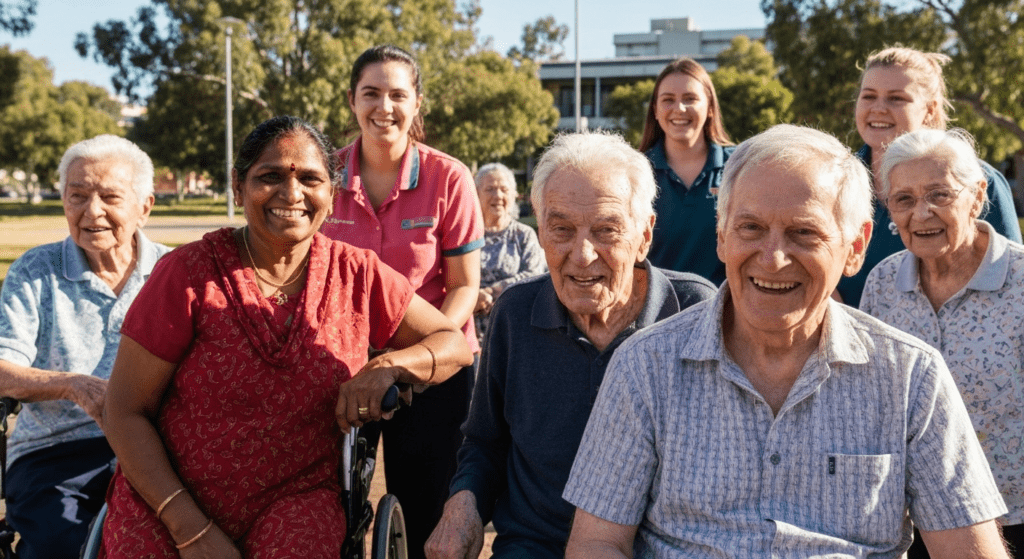Key Highlights
- Discover how quality aged care and NDIS services in Adelaide empower individuals to live with dignity and independence.
- Learn about personalised support options, including support coordination, in-home care, and Supported Independent Living (SIL).
- Explore specialised solutions like Specialist Disability Accommodation (SDA) and community nursing for complex needs.
- Understand the process of navigating the NDIS, from application to choosing the right disability service provider.
- See how inclusive care and community engagement programs can significantly enhance your quality of life.
- Find a registered NDIS provider that offers a compassionate, participant-centric approach to care.
Introduction
Welcome to your guide on quality aged care and disability services in Adelaide. Finding the right support is a crucial step towards living a more independent and fulfilling life. Whether for yourself or a loved one, understanding the available options can make all the difference. With the help of dedicated support workers, individuals can build essential life skills, participate in their community, and achieve their personal goals. This article explores how tailored disability support services can empower you to pursue your aspirations with confidence and control.
Empowering Lives Through Quality Aged Care & NDIS Services in Adelaide
In Adelaide, the focus of quality aged care and NDIS services in Adelaide is to empower you to live your best life. For NDIS participants, this means having access to a service provider that understands your unique journey and supports your goals, whether they involve building skills, finding employment, or engaging with the community.
The right disability support goes beyond basic needs; it’s about enhancing your overall well-being and providing peace of mind. By tailoring services to your specific circumstances, providers can help you navigate challenges and unlock your full potential. The following sections will explore some of the key services available.
1. Personalised Support Coordination for Independence
Navigating the NDIS can sometimes feel complex, but that’s where support coordination comes in. A support coordinator acts as your guide, helping you understand and implement your NDIS plan effectively. Their main goal is to connect you with the right services and supports that align with your individual needs and life goals.
This personalised approach ensures you get the most out of your funding. Your support coordinator can help you communicate with the NDIS, manage your budgets, and find the best service providers for your requirements. They work collaboratively with you to build your capacity to manage your own supports in the long term.
Ultimately, support coordination is about empowering you. It strengthens your support networks and gives you the confidence to make informed choices, fostering greater independence and control over your life and the services you receive. It’s a vital part of making your NDIS plan work for you.
2. In-Home Care and Assistance for Daily Living
Receiving support in the comfort and familiarity of your own home can make a significant difference to your daily life. In-home care is designed to assist you with a wide range of daily living activities, helping you maintain your independence and routine. This can include personal care, meal preparation, household tasks, and accessing the community.
Professional and compassionate support workers are at the heart of this service. They are carefully chosen to match your needs and personality, ensuring you feel comfortable and respected. Using your NDIS funding, you can arrange for support workers to visit at times that suit you, providing flexible assistance tailored to your lifestyle.
The aim is to help you live as autonomously as possible. Whether you need a little help to get your day started or more comprehensive support, in-home assistance empowers you to manage your daily activities with confidence and dignity, right where you feel most at ease.
3. Supported Independent Living (SIL) Options
For those who require more regular, day-to-day support, Supported Independent Living (SIL) offers a fantastic solution. SIL provides assistance and supervision with daily tasks to help you live as independently as possible. This support is often delivered in a shared living arrangement with a small number of other people.
The focus of SIL is on developing your skills for independent living. Support workers are available to help with personal care, cooking, cleaning, and managing your budget. It creates a nurturing environment where you can build confidence and take on more responsibility for your daily life.
Living in a SIL setting also provides valuable opportunities for social interaction and building relationships. It’s a great way to be part of a supportive household while still having your own personal space. This model is ideal for NDIS participants who are looking to increase their independence in a safe and pleasant home environment.
4. Specialist Disability Accommodation (SDA) Solutions
Specialist Disability Accommodation (SDA) is housing designed for people who have extreme functional impairments or very high support needs. This type of disability accommodation features specialised designs and assistive technology to help residents live more independently and receive their daily supports more effectively.
SDA is not about the support services themselves but the physical home. It’s for NDIS participants who require a specialist housing solution to manage their complex needs. These homes are built to be accessible and safe, promoting dignity and enabling people to live happy lives with the right physical environment.
Choosing an SDA solution means you can have a permanent, long-term home that is purpose-built for your needs. This stability is crucial for well-being and allows for the seamless delivery of other supports, like in-home care or community nursing, creating a holistic and secure living situation.
5. Community Nursing and Allied Health Services
For individuals with complex health needs, community nursing and allied health services are essential components of a comprehensive support plan. Community nursing brings professional healthcare into your home, delivered by registered nurses who are highly trained in managing complex medical conditions and providing high-intensity support.
These services can include wound care, medication management, continence support, and more. The goal is to provide expert clinical care in a familiar environment, reducing the need for hospital visits and empowering you to manage your health with confidence.
Alongside nursing, allied health services play a vital role. This can include occupational therapy to help with daily activities, behaviour support to manage challenging behaviours, and other therapies that improve your overall well-being. Together, these services form a dedicated team focused on your physical and mental health.
Navigating NDIS Eligibility and Access in South Australia
Gaining access to the National Disability Insurance Scheme (NDIS) is the first step for many NDIS participants in South Australia to receive the support they need. The process involves confirming your eligibility and then working with the National Disability Insurance Agency (NDIA) to create a plan that meets your goals.
Choosing a registered NDIS provider who can guide you through this journey is incredibly helpful. An experienced team can make the process less daunting, offering advice and assistance at every stage. The following sections will provide more detail on how the NDIS process works and how you can apply.
6. Understanding the National Disability Insurance Scheme Process
The National Disability Insurance Scheme (NDIS) is a government initiative designed to provide funding and support to Australians with a permanent and significant disability. Its primary aim is to help you build skills, participate in the community, and achieve your personal and professional goals, ultimately improving your quality of life.
The scheme provides funding directly to eligible individuals, known as participants. You can then use this funding to purchase disability services and supports from a service provider of your choice. This person-centric approach ensures you have control and choice over the support you receive in your NDIS plan.
The process can be broken down into a few key stages. Understanding these steps can help you feel more prepared as you begin your NDIS journey.
| Step | Description |
| 1. Check Eligibility | You must be under 65, an Australian citizen or specific visa holder, and have a permanent and significant disability. |
| 2. Make an Application | Gather required documents and submit an Access Request Form (ARF) to the NDIA. |
| 3. Plan Meeting | If eligible, you will meet with an NDIS representative to discuss your goals and support needs. |
| 4. Receive Your Plan | Your approved NDIS plan will outline your goals and the funding allocated to help you achieve them. |
| 5. Choose Providers | Select a registered NDIS provider to deliver the services outlined in your plan. |
7. How to Apply for NDIS Services in Adelaide
Starting your application for NDIS services in Adelaide is a straightforward process. The first step is to confirm that you meet the eligibility criteria, which relate to your age, residency, and disability. The NDIS is available for individuals aged between 7 and 65 who have a disability that significantly impacts their daily activities.
Once you believe you are eligible, you can begin the application by contacting the National Disability Insurance Agency (NDIA). You can do this by calling them directly to make a verbal inquiry or by requesting an Access Request Form (ARF). This form is the official start of your application for NDIS funding.
You can get the ARF by emailing the NDIA, downloading it from their website, or requesting it from a local NDIA office. You will need to complete this form and provide supporting information and evidence of your disability. A good disability support provider can often offer guidance on navigating this crucial first step.
8. Tips for Choosing the Right NDIS Provider
Selecting the right registered NDIS provider is one of the most important decisions you will make on your NDIS journey. Your provider will be your partner in achieving your goals, so it’s essential to find one whose approach and values align with yours. Look for an organisation that prioritises you and your needs.
A quality provider will have an experienced team with a deep understanding of disability care and the NDIS. They should be transparent about their services and costs, and they should be committed to helping you achieve positive outcomes. As one NDIS participant noted, “I have an amazing team around me,” which highlights the impact of having the right support.
When evaluating providers, consider their level of experience, their approach to care, and the qualifications of their staff. Here are a few key things to look for:
- A Participant-Centric Approach: Does the provider put you at the centre of all decision-making?
- Experience and Expertise: Do they have a proven track record, especially in areas relevant to your needs, like complex care?
- Qualified and Compassionate Staff: Is their team made up of dedicated professionals who are passionate about what they do?
- Clear Communication: Do they listen to you and ensure your family is kept up-to-date?
Enhancing Quality of Life Through Inclusive and Culturally Responsive Care
True quality of life comes from support that respects who you are as an individual. This means providing inclusive care that acknowledges your cultural background, personal preferences, and unique life goals. A great provider understands that a one-size-fits-all approach simply doesn’t work.
By offering culturally responsive and tailored supports, providers can create a safe and welcoming environment where you feel heard and valued. The following sections explore how this is achieved through specific programs and initiatives designed to foster community connection and cater to diverse needs.
9. Tailored Supports for Diverse Cultural Communities
Recognising and respecting cultural diversity is fundamental to providing excellent disability support. Many individuals feel more comfortable receiving care from someone who understands their cultural background and language. Leading service providers in Adelaide are committed to offering tailored supports that cater to various cultural communities.
This involves recruiting a diverse workforce and providing cultural competency training for all staff. It ensures that communication is clear, respectful, and sensitive to different customs and traditions. Do you feel that your cultural needs are being met by your current supports? A good provider will always ask this question.
By embracing diversity, these organisations create a more inclusive and effective care environment. Whether it’s through bilingual support workers or programs designed with specific cultural practices in mind, this approach ensures that every individual receives disability support that is not only effective but also deeply respectful of their identity.
10. Social Participation and Community Engagement Programs
A fulfilling life involves more than just support for daily tasks; it’s also about being an active and engaged member of your community. Social participation is a key goal for many NDIS participants, and quality providers offer programs specifically designed to foster connection and build relationships.
These programs might include group outings, recreational activities, skill-building workshops, or support to join local clubs and volunteer. The aim is to help you pursue your hobbies and interests, meet new people, and feel a stronger sense of belonging. This kind of community engagement is vital for mental and emotional well-being.
By participating in these activities, you can develop confidence, strengthen social skills, and build lasting friendships. It’s an essential part of a holistic approach to care that helps you live a rich and active life, connected to the people and places that matter to you.
11. Government Initiatives and Additional Disability Services in SA
While the NDIS is the primary source of funding for many, it’s important to know that there are other government initiatives and disability services available in South Australia. These programs often work alongside the NDIS to provide a more comprehensive support network for individuals and their families.
These initiatives can offer support in areas that may not be covered by an NDIS plan or provide supplementary assistance to the broader community. They reflect the state government’s commitment to creating an inclusive society where everyone has the opportunity to thrive.
Some of these additional services and initiatives might include:
- Community Visitor Schemes: Connecting volunteers with people who may be socially isolated.
- Concession and Companion Card Programs: Offering discounts on public transport and event tickets.
- Advocacy Services: Providing independent support to help you understand your rights and speak up for your needs.
- Local Council Programs: Offering accessible recreational facilities and community events.
Conclusion
In conclusion, the quality aged care and NDIS services in Adelaide play a vital role in empowering individuals to lead fulfilling lives. By providing personalised support, community engagement, and inclusive care options, these services enhance the quality of life for seniors and those with disabilities. Understanding and navigating the NDIS process can seem daunting, but with the right guidance and resources, individuals can access the support they need. As we continue to advocate for better care and services, remember that your well-being is paramount. If you’re ready to explore your options and find the right support for you or a loved one, don’t hesitate to reach out for a free consultation today!
Frequently Asked Questions
What types of disability supports are available with NDIS in Adelaide?
In Adelaide, NDIS participants can access a wide range of disability support services. An NDIS provider can connect you with support workers for daily living, support coordination to manage your plan, community nursing, Supported Independent Living (SIL), Specialist Disability Accommodation (SDA), and programs that encourage social and community participation.
Can I change my NDIS provider if I’m not satisfied with their services?
Yes, absolutely. You have complete choice and control over your supports. If you are not satisfied with your current NDIS provider, you have the right to end your service agreement and choose a new registered NDIS provider that better meets your needs, ensuring you receive the support that leads to positive outcomes.
Where can I get help understanding my NDIS plan in Adelaide?
An experienced team from a registered service provider can help you understand your NDIS plan. Support coordination is a specific disability service designed for this purpose. A support coordinator will work with you to interpret your plan, connect you with services, and ensure your funding is used effectively to achieve your goals.


 Edward Strzelecki is a valued article writer at Body Care And Matter, known for his straightforward and accessible approach to health and wellness topics. With a focus on clarity and practicality, Edward's writing provides readers with easy-to-understand information that they can apply in their daily lives.
Edward Strzelecki is a valued article writer at Body Care And Matter, known for his straightforward and accessible approach to health and wellness topics. With a focus on clarity and practicality, Edward's writing provides readers with easy-to-understand information that they can apply in their daily lives.

